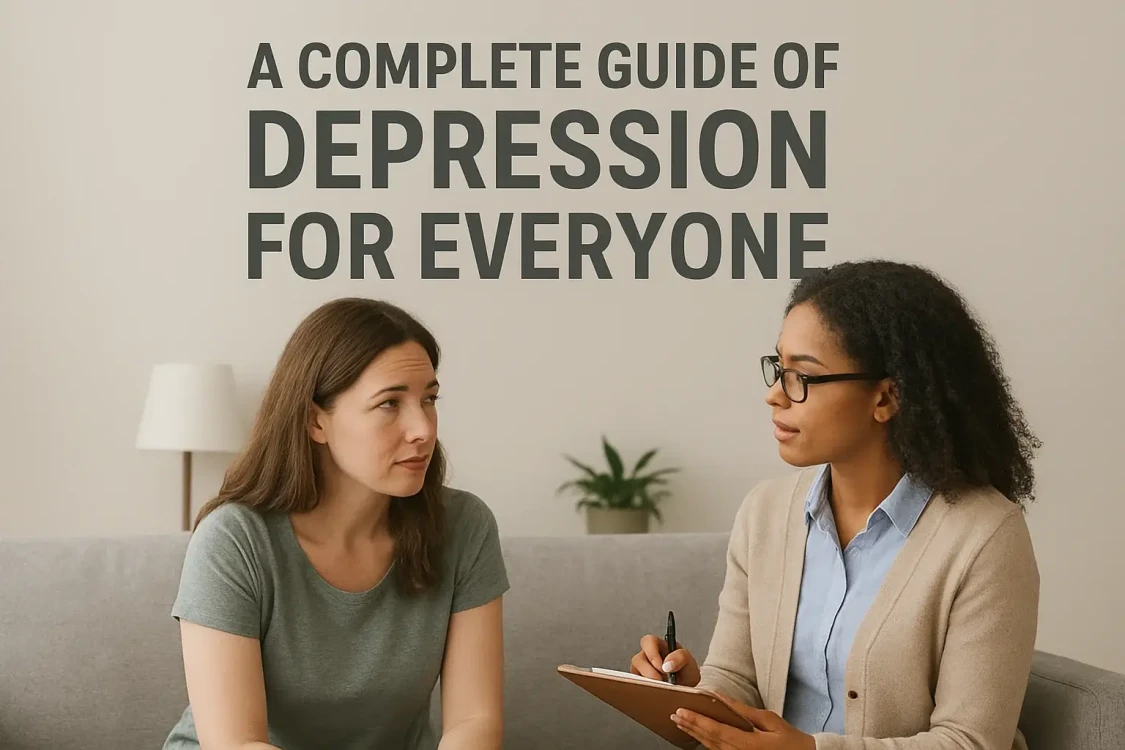Depression goes beyond just feeling sad. It's a serious medical condition that impacts millions globally. Depression impacts thoughts, feelings, and daily activities. It can make work, school, and time with loved ones more difficult.
Discussing depression is crucial. It shows people they aren't alone and that help exists. Depression is hard, but with support and treatment, people can improve and enjoy life.
This article will discuss the types of depression, its causes, how to recognize the signs, and how to treat it. We'll also provide tips for coping and guidance on when to seek professional help.
What is Depression?
"Depression is a mental health disorder. It brings ongoing sadness and a lack of interest. This can impact daily life."
Depression is not the same as normal sadness. We all feel sad sometimes, like when we lose a game or a friend moves away. But clinical depression means these tragic feelings last for weeks or months. They make it hard to enjoy the things you once loved.
The World Health Organization and mental health experts use specific guidelines to diagnose depression. The DSM-5 is an essential guide for doctors. It states that depression has several symptoms that occur most days for at least two weeks.
Regular sadness usually has a clear cause and improves over time or when things get better. Depression can occur even when life seems fine. It alters your brain's function. Simple tasks can feel overwhelming or even impossible.
Types of Depression
Several different types of depression affect people in various ways:
Major Depressive Disorder (MDD)
This is the most common type, where people feel very sad or empty most days for at least two weeks. It makes everyday activities feel overwhelming and challenging to complete.
Persistent Depressive Disorder (Dysthymia)
This is a milder but longer-lasting form that can continue for years. People can function but feel consistently low and unhappy most of the time.
Seasonal Affective Disorder (SAD)
This happens at certain times of the year, often in winter, when there's less sunlight. People feel depressed during specific seasons but feel better when the season changes.
Postpartum Depression
This affects some women after having a baby and is much more serious than regular "baby blues." It can make caring for the new baby and yourself very difficult.
Bipolar Depression
Bipolar disorder has two main parts: depression and high-energy bursts called mania or hypomania.
Each type of depression feels unique, but all involve shifts in mood, thought, and daily life. Some people may have high-functioning depression. They can go to work or school, but they often feel empty inside.
Common Causes of Depression
Depression happens because of a mix of different factors working together.
Biological factors include genetics. This means depression can run in families. Changes in brain chemistry also affect how we feel and think.
Psychological factors are important as well. Trauma, abuse, and stress can lead to depression. People who experience these events are at higher risk. This might mean losing someone you love, facing a divorce, or coping with a serious illness.
Environmental factors involve our lifestyle and surroundings. Chronic illness, some medications, and drug or alcohol use can contribute to depression. Situational depression can occur after tough times, like losing a job or dealing with relationship issues.
It's important to know that depression isn't anyone's fault. You can't just "snap out of it" or think positive thoughts to make it go away. It's a real medical condition that needs proper care and treatment.
Signs and Symptoms
Featured Snippet Optimization:
- Persistent sadness or empty feelings that don't go away
- Loss of interest in activities you used to enjoy
- Fatigue and low energy, even after sleeping
- Sleep changes, such as insomnia or sleeping too much
- Thoughts of hopelessness or self-harm
Depression affects both your emotions and your body.
Emotional symptoms may include feelings of hopelessness, worthlessness, or guilt. These feelings can arise even over things that aren't your fault. You might feel irritable or angry more often. You may also feel like crying for no apparent reason.
Physical symptoms can show up as changes in appetite, where you might eat too much or too little. You may experience unexplained aches, headaches, and digestive issues. Many people with depression find it hard to concentrate at work or school. Decision-making and memory can also be affected.
If you're feeling like you might hurt yourself or think life isn't worth living, please get help right away. These thoughts are symptoms of depression and not a reflection of reality. With the proper treatment, things can improve.
How is Depression Treated?
"Treatment for depression includes therapy, medication, and lifestyle changes."
Depression is very treatable, and most people who get help start feeling better. Three main approaches work best when used together:
Therapy Options
Therapy is a key treatment, especially cognitive behavioral therapy (CBT). CBT helps people change negative thought patterns. Psychotherapy offers a safe space to discuss feelings and learn new coping skills.
Medication Treatments
Medication can also be beneficial. Antidepressants like SSRIs and SNRIs help balance brain chemicals that affect mood. These medications often take a few weeks to kick in. It's key to collaborate with a doctor to find the right one.
Lifestyle Changes
Lifestyle changes are an essential part of treatment, too.
Regular exercise can be as effective as medication for some people with mild to moderate depression. Getting enough sleep, eating healthy foods, and practicing mindfulness or meditation can lift mood and energy levels.
Many people find a mix of therapy, medication, and lifestyle changes helpful. Depression treatment isn't the same for everyone, so it's important to work with mental health professionals to create a plan that fits you.
Please consult with qualified healthcare providers before making any treatment decisions.
Coping Strategies & Self-Help Tips
You can manage depression symptoms alongside professional treatment in several ways. Writing, drawing, or making music can help you manage feelings and monitor your mood.
Building a support system is key. This can include family, friends, support groups, or online communities. Connecting with others who understand can make a big difference. Don't hesitate to reach out for help.
Limiting alcohol and drug use is essential. These substances can worsen depression. Instead, focus on daily routines and self-care. Simple tasks like showering, getting dressed, eating regular meals, and spending time outside can help.
Small accomplishments count when dealing with depression. Set tiny, achievable goals like making your bed or calling a friend. These steps can build momentum and boost your sense of accomplishment.
When to Seek Professional Help
If you're thinking about suicide or self-harm, reach out for help. Also, get support if depression is making daily life hard. Warning signs include being unable to work, go to school, or take care of basic needs for several days or weeks.
Crisis resources are available 24/7 if you need immediate help. The National Suicide Prevention Lifeline (988) provides free, confidential support. Many communities also have mental health crisis centres and emergency services.
Seeking help for depression is as important as treating any medical condition. There's no shame in asking for support. Getting help early can stop depression from worsening. Mental health professionals are trained to assist and have seen it all before.
Final Thoughts
Depression is a treatable medical condition. With the right help and support, people can get better. Recovery is possible, even when depression feels overwhelming or hopeless. Many people who have struggled with depression go on to live full, happy, and meaningful lives.
If you think you might have depression, don't wait to get help. Talk to someone you trust. This could be a family member, friend, teacher, or healthcare provider. You are not alone in this struggle, and you deserve to feel better. Taking the first step to seek support is brave and shows real strength.


Comments